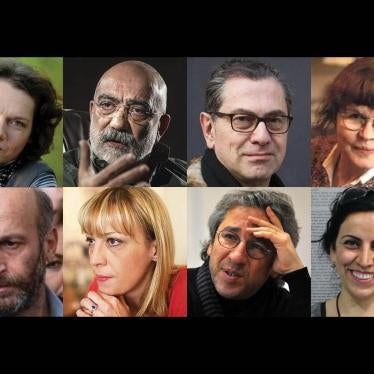The Georgian authorities are indulging and abetting mob violence against non-Orthodox Christian worshippers, Human Rights Watch said today.
In a 14-page memorandum released today, Human Rights Watch urged the Bush administration to challenge the Georgian government's failure to address the violence, and called for the U.S. Commission on International Religious Freedom to visit Georgia and investigate. In early September the administration is due to release its annual report on global religious freedom.
"People should be entitled to worship without fear," said Elizabeth Andersen, executive director of the Europe and Central Asia division of Human Rights Watch. "For two years now these groups have had carte blanche for violence. It's time for the Georgian authorities to start investigating, arresting, charging, and detaining them."
More than 40 attacks have taken place this year; more than 80 violent incidents have been reported since 1999. The memorandum, based on first hand interviews with victims, documents ten of the attacks that have taken place in 2001. The assailants, civilian militants who are sometimes led by Orthodox priests, have meted out beatings, ransacked homes, and destroyed religious literature. The mobs target Jehovah's Witnesses, Pentacostalists, Baptists, and followers of other Christian faiths non-native to Georgia, attempting to intimidate them into abandoning their faith. Encouraged by government and police inaction, the frequency of attacks is on the rise.
President Eduard Shevardnadze has spoken out against the attacks and ordered police and prosecutors to "identify and punish" perpetrators, but the authorities have failed to investigate seriously or make arrests. The leader of the majority of the attacks, Vasili Mkalavishvili, a defrocked Orthodox priest, openly claims to receive help from the police and security services. Police officers have failed to intervene to protect the victims and in some cases the police themselves have violently broken up prayer gatherings.
Since last year, mob attacks have spread from Georgia's capital, Tbilisi, to other towns and rural areas. In March of this year an Orthodox priest on horseback led a crowd of 150 in breaking into a private house in the town of Sachkhere, where Jehovah's Witnesses were holding a prayer meeting, and beating worshippers inside. In February, Mkalavishvili and his followers rushed into the courtyard of a private home in Tbilisi and beat Jehovah's Witnesses there with clubs, large crosses and Bibles after police forced open the gate for them. On April 30, Mkalavishvili's supporters broke up another Jehovah's Witnesses prayer meeting in Tbilisi, attacking worshippers with sticks spiked with nails and putting three of them in hospital.
Human Rights Watch said that leading Georgian institutions bear heavy responsibility for creating the atmosphere of hostility and intolerance towards non-Orthodox Christian faiths in which these violent attacks have flourished. Law enforcement agencies' failure to prosecute the perpetrators of such attacks has given a green light for further violence and hostility. The Georgian Orthodox Church has failed to condemn the violence explicitly. Since 1998 it has lobbied for laws to gain special status and to have restrictions placed on other faiths. In February the Supreme Court ruled to deregister the Jehovah's Witnesses as a legal entity in Georgia.
The Supreme Court decision prompted a new surge of violent attacks. Local level police, customs officers and Orthodox priests leapt to interpret the decision as a ban on Jehovah's Witnesses' activities. They have used it variously to disperse prayer meetings, confiscate literature, and to issue new threatening ultimatums.
"The rule of law is giving way to mob law on this in Georgia," said Andersen. "The Georgian authorities and their international partners need to put a stop to it."







